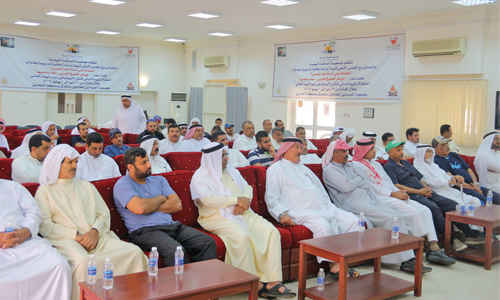Fishermen caught in shrimping ban net
Manama : Several local fishermen will be left jobless for the next six months once the “shrimping ban” comes into force from Wednesday, members of the Bahrain Fishermen Society (BFS) and Sitra Fishermen Society (SFS) have said.
Addressing a press conference at Bahrain Fishermen Society (BFS) in Muharraq yesterday, members of these Societies said that the government decision would leave at least 400 fishermen, who are only licensed to catch shrimps and not any other sea creatures, jobless.
Around 80 Bahraini fishermen gathered at BFS to voice their concern over the recent decision taken by Works, Municipalities Affairs and Urban Planning Minister Essam Khalaf to ban the catch and sale of local shrimps for six months, beginning March 15.
Calling the decision a ‘blunder’, the fishermen expressed their concern over the faulty strategies of the Agriculture and Marine Resources officials in the Ministry. They said the decision to enforce ban was taken without consulting the fishermen’s community or providing any alternative. The press conference was jointly organised by BFS and Sitra Fishermen Society (SFS).
PM’s intervention sought
BFS Chairman Waheed Al Dossary has urged the Prime Minister HRH Prince Khalifa bin Salman Al Khalifa to intervene in the matter and halt the “sudden” decision which would hurt the livelihood of hundreds of fishermen and their families.
“How could these citizens and their families survive without an income for six months. They have loans with banks, need to maintain their equipment, give wages for fish workers. This is an unfair decision, as more than 90 per cent of the Bahraini fishermen have no other source of income but their catch,” Al Dossary expressed.
“Extending the ban period from four months to six will have negative impacts on local fishermen. Fishermen have to pay fees to the Government for the residency and insurance of their workers. If they delay payments they will be fined. Many of the fishermen have taken loans from banks to run their businesses,” BFS and SFS said in a joint statement.
“Marine equipment are highly priced. They will be prosecuted in case these debts aren’t paid. Besides, these equipment would malfunction if not used for long periods. This means more expenses to fix them,” BFS and SFS said. Call for consultation The Societies have called upon the authorities to seek advice from experienced fishermen before implementing any decisions. They stressed on the necessity to meet the minister and share their grievances with him. “The officials are not aware of the actual issues and requirements of the sector,” they claimed.
Flawed Strategy
Several fishermen said that the licensing strategy of the directorate is not fool proof.
“We have problems in this sector that the authorities aren’t aware of. Flooding the market with fish licences, while we suffer from the lack of fishing areas in our waters is unwise,” said BFS Member Abdulamir Al Mughanni.
“There are numerous factors that are threatening marine resources in Bahrain that the directorate has not noted. The main threats are the ongoing dredging and land reclamation processes. This has led to reduction of fishing habitats and the crowding of fishermen in a small geographical area. The dredging will eventually drain the fish population in our sea, in addition to the migration of many fish breeds. The sector needs comprehensive reforms which can’t be done one-sided,” Al Mughanni added.
Stop violators The fishermen also demanded the related authorities to penalise violators of the ban. “The ban won’t benefit the crops as long as it’s being frequently breached by many unlicensed fishermen. We have been monitoring the market since the ban was first implemented in 1980. There have always been breaches and shrimps are sold in the market during the ban period. “There are no deterrent procedures taken against violators. They are only fined with trifle amounts. They soon come back to the same practices,” Al Dossary told DT News on the sidelines of the conference. He affirmed that the fishermen will agree to a four-month ban on shrimping, provided tighter supervision on the practice is implemented. As reported earlier, the ban on shrimping is annually implemented for a period of four to six months, in a bid to preserve shrimp corps and allowing them to reproduce. This year the ban will be enforced from Wednesday.
Related Posts




